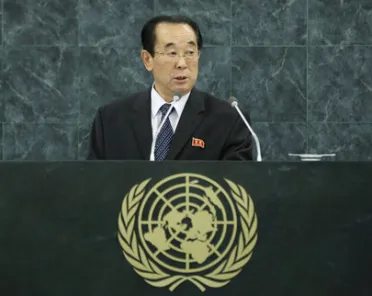Statement
Statement summary
PAK KIL YON, Vice Minister for Foreign Affairs of the Democratic People’s Republic of Korea, said high-handedness and arbitrariness were ever more rampant in international relations. Infringements of sovereignty, interference in domestic affairs and regime change continued unabated under the pretexts of “non-proliferation” and “human rights protection”, for which the United Nations was being abused. Such behaviour by a specific State undermined peace and security and should therefore be rejected in international relations, with a view to achieving genuine cooperation and development among countries, based on sovereign equality, he said. The infringement of Syria’s sovereignty and territorial integrity should not be allowed, and the blockade imposed on Cuba by the United States should be brought to an end at the earliest possible date. He went on to emphasize the need for reform of the United Nations, saying that issue could brook no further delay. The General Assembly should be empowered to have the final say on key international issues since it represented the general will of the entire membership. Security Council resolutions authorizing sanctions and the use of force should be effective only after the Assembly’s approval. Instances of a certain State abusing the Council as a tool of its strategic interests should never go unchallenged, he stressed, recalling that, in January, the United States had “manipulatively” forced the adoption of the unfair sanctions resolution against “our legitimate satellite launch for peaceful purposes”, which was recognized under international law. Turing to the situation on the Korean peninsula, he said the only way to ensure lasting peace there was to end the hostile policy of the United States. That country should respect the sovereignty of the Democratic People’s Republic of Korea, replace the Armistice Agreement with a peace mechanism dismantling the United Nations Command, lift all sanctions and stop military threats. Reunification was a long-cherished desire and the most pressing task of the Korean nation, he said, adding that, thanks to his country’s “active and generous efforts”, a window of opportunity for improving North—South relations was opening up after a long period of deadlock. However, the outdated confrontational approach of the Republic of Korea authorities was putting relations in danger of falling back into the destructive stage, he warned.
Full statement
Read the full statement, in PDF format.
Photo

Previous sessions
Access the statements from previous sessions.
